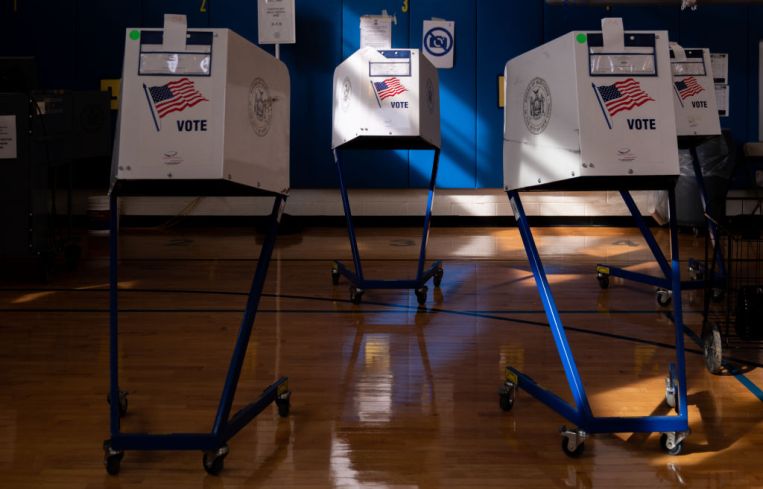The Races to Watch in NYC’s Tuesday Primary
By Aaron Short June 27, 2023 3:12 pm
reprints
New Yorkers annoyed that a truck depot is operating on a Harlem site instead of an affordable housing complex have their opportunity to make their feelings known at the polls Tuesday.
All 51 New York City Council seats are up for re-election this year, thanks to the city’s redistricting process that mapped out new lines for each City Council district last fall.
Most candidates, as well as two district attorney offices, are facing primary challenges. Two seats are open and among the most hotly contested in the city, while several others are expected to be close races. Ranked choice voting has also returned, allowing voters to select more than one candidate and list them in order of preference.
So far, voters have barely noticed. As of noon, only 83,903 New Yorkers cast their ballots in the primary, according to the city Board of Elections. That’s slightly over 2 percent of the city’s registered Republicans and Democrats.
The infinitesimal turnout hasn’t stopped developers, labor unions and other donors from pouring hundreds of thousands of dollars into campaign ads to help the candidates they want to win. In just a few hours, they will see if their efforts paid off.
Districts to Watch
The most competitive race this spring is probably Councilwoman Kristin Richardson Jordan’s former Council seat in Central Harlem.
Jordan narrowly won her seat two years ago, making her one of several Democratic Socialists in the Council. She ran for re-election this year and faced three opponents, including two veteran state lawmakers, but dropped out weeks before the primary.
Her allies believed a lack of institutional support from the Manhattan Democratic Party as well as negative media coverage from her opposition to Bruce Teitelbaum’s One45 project — which Teitelbaum turned into a truck depot before trying to revive the One45 development — affected her decision. (Developers and other donors also threatened to spend thousands of dollars to advertise against her.)
Now the race is down to three people — Assembly members Inez Dickens and Al Taylor, and Yusef Salaam, a member of the exonerated Central Park Five. Dickens nabbed endorsements from Mayor Eric Adams and Rep. Adriano Espaillat, plus has been a staunch ally of the Real Estate Board of New York thanks to her opposition to pro-tenant laws.
Salaam snapped up endorsements from the other half of Harlem’s power players including Manhattan Democratic Chair Keith Wright, former Borough President C. Virginia Fields, and Assemblymember Danny O’Donnell.
The other contest drawing a crowded field is a new Asian-majority district in Bensonhurst and Sunset Park, Brooklyn, that the City Districting Commission created last year to increase representation in the Council.
Democrats Susan Zhuang, Stanley Ng and Wai Yee Chan and Republicans Ying Tan and Chingkit Ho are competing for a shot in the November general election with campaigns focused on improving public safety, access to quality education and creating more low-cost housing.
Several other incumbents could be in trouble.
In Lower Manhattan, Councilmember Christopher Marte is facing a tough challenge from nonprofit leader Susan Lee in a race touching on a myriad of issues including the construction of borough-based jails, e-bike enforcement, outdoor dining permits, and building senior housing on the Elizabeth Street garden site.
In East Brooklyn, Councilmember Darlene Mealy is going up against Isis McIntosh Green, who secured an endorsement from the Working Families Party and several labor groups.
In the Bronx, Councilmember Marjorie Velazquez is fending off three opponents, Irene Estrada, John Perez and Bernadette Ferrara, who argue she is too progressive for the district.
In Forest Hills, Queens, Councilmember Lynn Schulman is defending her seat against Ethan Felder, a district leader and Queens Community Board 6 member, and Sukhjinder Nijjar.
In Northwest Queens, Councilwoman Julie Won is facing Hallie Kim, who unsuccesfully ran for the seat two years ago.
And in Northeast Queens, Councilmemeber Linda Lee is tangling with challengersSteve Behar and Rubaiya Rahman on affordable housing, education, and climate change.
Money to Burn
Even though it is an off-year primary, labor unions and other special interests have spent nearly $1.5 million so far to promote candidates they want and derail those they dislike.
A coalition of labor unions — including the Hotel Trades Council, property workers and superintendents, and municipal workers — have spent $686,571 through a political action committee to support 11 candidates, according to city campaign records.
Meanwhile, a pro-business PAC called Future NYC has dumped $372,100 into seven races to re-elect moderate officeholders facing opponents while spending another $37,090 to prevent two progressive challengers from unseating incumbents.
The mason tenders have kicked in another $135,385 to support five candidates, while the carpenters union spent $153,296 to support another four candidates, including Velazquez, Taylor and Won. Then there’s The Police Benevolent Association, which represents about 24,000 patrolmen. The PBA spent $58,675 to oppose incumbent Councilmembers Marte and Charles Barron, both of whom have argued for shrinking the New York City Police Department’s budget.



